American Hangman
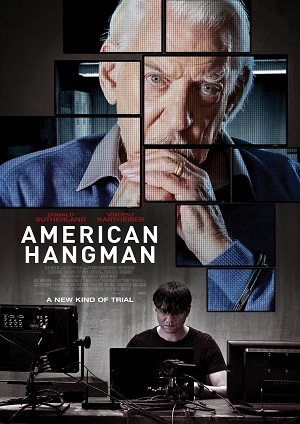 Taking Court TV to the next level.
Taking Court TV to the next level.
Cast of Characters:
Judge Oliver Straight – Donald Sutherland
Henry David Cole – Vincent Kartheiser
Lt. Roy – Oliver Dennis
Det. Steptoe – Al Sapienza
Ron – Paul Braunstein
Harper Grant – Lucia Walters
Det. Stokely – Joanne Boland
Barbara – Genelle Williams
Director – Wilson Coneybeare
Screenplay – Wilson Coneybeare
Producer – Meredith Fowler, Jim Sternberg & Wilson Coneybeare
Not Rated
Two men – Ron (Paul Braunstein) and Oliver Straight (Donald Sutherland) – wake up to find themselves abducted and locked in a musty, concrete basement. Ron makes references to Saw, convinced they’re in a similar deadly predicament; however, their captor Henry David Cole (Vincent Kartheiser) has something else in store for them. Seeking retribution for a murder case he believes led to the death of an innocent man, Cole is putting Straight, the former judge at the center of it all, on the witness stand in front of live-streaming cameras. With the clock ticking, it’ll be up to the online audience to decide which verdict Straight will receive.
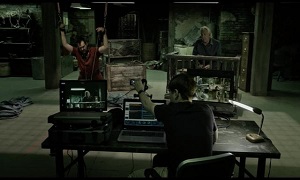 Though it’s not without any form of relevance given our dependence on social media and the cynical climate it has created today, the concept of American Hangman isn’t exactly new. We’ve seen before films built on premises of dungeon-based puzzle-solving to the death, and America’s obsession with both social media, sensationalized news and reality TV. You don’t need to dig too deep to discover the Saw franchise (to which credit should be given to this film for at least acknowledging), Cube or Disconnect, to name a few. Even long before the social media explosion – back when “viral sensation” referred to that burning feeling you get while peeing and not your hit video on YouTube – EDtv, The Truman Show, The Chase and the Oscar-winning Network tackled media-based ideas that while seemingly far-fetched for their time, are now literally a part of our lives for almost every waking second.
Though it’s not without any form of relevance given our dependence on social media and the cynical climate it has created today, the concept of American Hangman isn’t exactly new. We’ve seen before films built on premises of dungeon-based puzzle-solving to the death, and America’s obsession with both social media, sensationalized news and reality TV. You don’t need to dig too deep to discover the Saw franchise (to which credit should be given to this film for at least acknowledging), Cube or Disconnect, to name a few. Even long before the social media explosion – back when “viral sensation” referred to that burning feeling you get while peeing and not your hit video on YouTube – EDtv, The Truman Show, The Chase and the Oscar-winning Network tackled media-based ideas that while seemingly far-fetched for their time, are now literally a part of our lives for almost every waking second.
So, no, it doesn’t appear to be as clever or original as it wishes to be. However, as Roger Ebert would always remind his readers, “It’s not what a movie is about, it’s how it is about it.”, so who knows? I have been pleasantly surprised by January limited theatrical/VOD releases before. Not often, but it is possible.
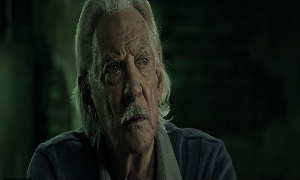 The Good: American Hangman bounces back and forth between three connecting subplots – the trial between Judge Straight and his captor, the police case revolving around the whereabouts of this hidden trial, and the online world’s fixation on the live stream of said trial. Writer/director Wilson Coneybeare’s presentation throughout all three can be best described as workmanlike; however, he does manage to build some effective tension when necessary, and the film is at its most tense when it stays focused on the captive and captor. While the few surprises and turns that unfold over the course of their conflict aren’t actually all that surprising, the philosophical back and forth between them does make for an engaging battle of wits.
The Good: American Hangman bounces back and forth between three connecting subplots – the trial between Judge Straight and his captor, the police case revolving around the whereabouts of this hidden trial, and the online world’s fixation on the live stream of said trial. Writer/director Wilson Coneybeare’s presentation throughout all three can be best described as workmanlike; however, he does manage to build some effective tension when necessary, and the film is at its most tense when it stays focused on the captive and captor. While the few surprises and turns that unfold over the course of their conflict aren’t actually all that surprising, the philosophical back and forth between them does make for an engaging battle of wits.
The film’s top strength lies in its two leads, Donald Sutherland and Vincent Kartheiser, both of whom are in great form here. Sutherland – possibly the greatest actor to never be nominated for an Oscar, much less win one – has his trademark calm, stoic demeanor on full display, while showing touches of vulnerability when faced with mounting pressure. Kartheiser borders close on caricature, no thanks in part to the tacky, cliché look he’s saddled with (more on that later), but he nevertheless acquits himself nicely with an effectively jittery yet calculating turn opposite the veteran Sutherland.
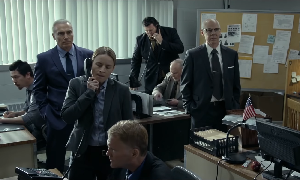 The Bad: Unfortunately, despite the fine efforts of its two lead stars, the film takes a quality nose dive when it diverts attention away from their setting. Any tension generated during their standoff deflates when entering the outside world, even during pivotal moments where you would expect dramatic tension to arise. Key scenes such as when one detective tries wrangling away control of the case from another, or when the Lieutenant criticizes a detective for his rushed handling of a past murder investigation that led to this current abduction case should not play out as pedestrianly as they do here. It doesn’t help matters any that along with the tension, the acting talent too remains confined in the basement, as the supporting work on the outside ranges between marginally serviceable to not so good. This is where Coneybeare’s workmanlike style, both in direction and writing, serves as a detriment to the film. It doesn’t take the keenest eye in the world to see that this film wears its low-budget on its sleeve, nor does it take the sharpest ears to understand that Coneybeare’s knowledge of police investigations and the media seems limited only to what he could derive from other, far more superior films. That can mostly be forgiven while watching Sutherland and Kartheiser’s back and forth ’cause their performances elevate the proceedings; however, when they’re not onscreen to carry the weight, the cheap, made-for-TV vibe sticks out like a sore thumb.
The Bad: Unfortunately, despite the fine efforts of its two lead stars, the film takes a quality nose dive when it diverts attention away from their setting. Any tension generated during their standoff deflates when entering the outside world, even during pivotal moments where you would expect dramatic tension to arise. Key scenes such as when one detective tries wrangling away control of the case from another, or when the Lieutenant criticizes a detective for his rushed handling of a past murder investigation that led to this current abduction case should not play out as pedestrianly as they do here. It doesn’t help matters any that along with the tension, the acting talent too remains confined in the basement, as the supporting work on the outside ranges between marginally serviceable to not so good. This is where Coneybeare’s workmanlike style, both in direction and writing, serves as a detriment to the film. It doesn’t take the keenest eye in the world to see that this film wears its low-budget on its sleeve, nor does it take the sharpest ears to understand that Coneybeare’s knowledge of police investigations and the media seems limited only to what he could derive from other, far more superior films. That can mostly be forgiven while watching Sutherland and Kartheiser’s back and forth ’cause their performances elevate the proceedings; however, when they’re not onscreen to carry the weight, the cheap, made-for-TV vibe sticks out like a sore thumb.
Another missed opportunity that the film never capitalizes on like it could have is its teased angle of everyday, ordinary online users playing judge, jury and executioner, much in the same way baseless online rumors and Twitter mobs smear and destroy people today whether or not they deserve it. Oddly enough, as toothless as Coneybeare’s commentary on society’s social media crazed cynicism is, what happens in the real world seems far more sensationalized than this film. At best, the film’s bite barely gets skin deep, leading all the way to a conclusion that ultimately falls flat.
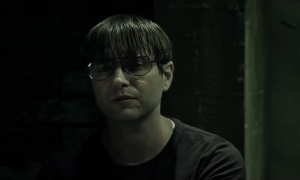 The Ugly: Look, I get it. You want to portray the film’s antagonist as a mentally disturbed individual, but can we stop with the dopey, combed-down hair look we’ve seen in every other movie featuring disturbed villains? Is that the key, signature sign of maniacal, demented intelligence? The hair? Hell, I had the same hairdo back when I was a kid, but I was hardly a disturbed, vengeful genius. I was just a fifth grader with horrible taste. It’s peak unimaginative hairstyling, right up there next to transforming your middle-aged actors into high-schoolers simply by making their hair look moppier, despite the fact that they’re still rocking a five o’clock shadow as rough as sandpaper (Dexter, I love you to death, but even you were guilty of the latter multiple times in flashback sequences).
The Ugly: Look, I get it. You want to portray the film’s antagonist as a mentally disturbed individual, but can we stop with the dopey, combed-down hair look we’ve seen in every other movie featuring disturbed villains? Is that the key, signature sign of maniacal, demented intelligence? The hair? Hell, I had the same hairdo back when I was a kid, but I was hardly a disturbed, vengeful genius. I was just a fifth grader with horrible taste. It’s peak unimaginative hairstyling, right up there next to transforming your middle-aged actors into high-schoolers simply by making their hair look moppier, despite the fact that they’re still rocking a five o’clock shadow as rough as sandpaper (Dexter, I love you to death, but even you were guilty of the latter multiple times in flashback sequences).
I mean, Hannibal Lecter didn’t need some stupid looking bowl cut. That crazy bastard looked as suave, smooth and sophisticated as they come.
Just saying.
Consensus: Despite an intriguing setup and strong lead work from Donald Sutherland and Vincent Kartheiser, American Hangman’s potential is held back by a sub-par script and tepid treatment of its timely themes.
Silver Screen Fanatic’s Verdict: I give American Hangman a C (★★).
